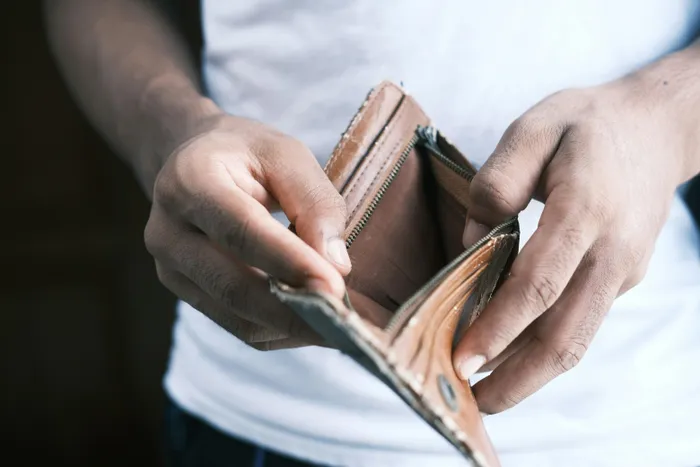How to break free from the chains of debt and reclaim your financial future

Debt can feel like a heavy burden, limiting your financial freedom and controlling your life. This article explores the true cost of debt, offers practical strategies for managing it, and encourages a mindset shift towards financial independence.
Image: Towfiqu Barbhuiya
Debt may seem like a means to an end – a necessary part of modern life. But for many, it’s more than just money owed. Debt is a weight that holds you back, a chain that limits your freedom, and a slow drain on your financial future. The harsh reality is that every rand of debt you carry isn’t just a number – it’s a claim on your time, your income, and your choices.
For those caught in the cycle of debt, financial progress can feel like running on a treadmill. No matter how hard you work, you’re not moving forward. The burden of repayments eats into your salary before you even see it. That car loan, those store cards, the mortgage – they all claim a portion of your earnings, leaving you with little to invest, save, or enjoy.
Debt quietly controls more than just your money – it controls your life. It affects the decisions you make, the risks you can’t take, and the dreams you delay. It can keep you in a job you dislike simply because you can’t afford to walk away. It can prevent you from starting a business or investing in your future. When you're buried under repayments, survival becomes your only focus. There's little room for bold financial decisions or long-term planning.
The ease of access to credit makes the situation even worse. It only takes a few minutes to apply for a loan or swipe a credit card, but the repayments last for years. We’re sold on the idea of lifestyle on credit – the shiny car, the designer clothing, or the dream home – but rarely do we understand the true cost. That million rand home could end up costing you R2.3 million over 20 years with a 10% interest rate. Suddenly, it’s not such a dream after all.
The illusion of wealth is everywhere. Social media fuels the need to ‘look rich’ – but the truth is, many who appear wealthy are drowning in debt behind the scenes. It’s not the person with the biggest house or newest phone who is financially secure – it’s the one who has control over their income and minimal liabilities.
The golden rule remains: if you can’t afford to buy something in cash, you probably can’t afford it at all.
If real financial freedom is what you’re after, then it’s time to face your debt head-on, not someday, but today. Many people assume they’ll tackle debt once they earn more, but often, the more you earn, the more you spend. The key is to change your mindset first and build discipline into your habits.
Start with a plan
The first step is to take stock. List all your debts – big and small – and understand exactly how much you owe and what interest rates you’re paying. Then commit to a strategy. One effective approach is the debt snowball method:
1. Pay off your smallest debt first while maintaining minimum payments on others.
2. Once the smallest is cleared, roll that payment into the next debt.
3. Repeat the process until all your short-term, high-interest debts, such as credit cards and personal loans, are gone.
Set a target date to be debt-free. Without a clear timeline, it’s too easy to push the goal further and further away.
Get serious
Be aggressive in your pursuit of debt freedom. This could mean taking on extra work, selling unused items, or drastically reducing unnecessary spending. Living below your means might not be fun now, but it can give you decades of financial peace. Include your family in the plan so everyone understands the sacrifices and the goal. That might mean no holidays for a while or driving a used car instead of financing a new one, but the payoff is worth it.
Once your short-term debt is under control, focus on your long-term obligations. Start chipping away at your mortgage or vehicle finance. Paying your home loan off early can save you hundreds of thousands of rands in interest. Why commit to 20 years of repayments when you could finish in 15?
Debt as a tool – Use with caution
Not all debt is indeed bad. Used wisely, debt can be a tool to invest in property, education, or a business. But the key is whether that debt is helping you grow your wealth or simply funding consumption. Leveraging finance only makes sense if it leaves you better off in the long run.
The problem is that most people never get off the leash. They move from one loan to the next, from one credit card to another. Instead of building assets, they build repayments. That’s why it’s critical to get into the habit of owning your pay cheque and your choices, instead of handing them over to a lender.
Own your future
Ultimately, the decision is yours. You can choose to let debt define your financial life, or you can take control. Freedom doesn’t come from more stuff; it comes from less obligation. When your money works for you instead of the bank, that’s when you begin to build real wealth.
So take control. Review your debt. Create a plan. Be ruthless. Because when you own your debt, you own your future — and that’s worth more than anything you could buy on credit.
* Prinsloo is the senior financial planning consultant at Alexforbes.
PERSONAL FINANCE